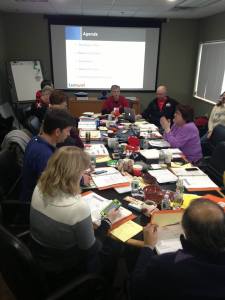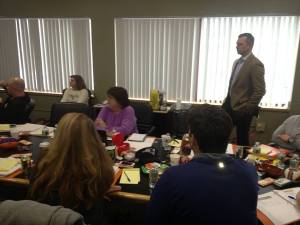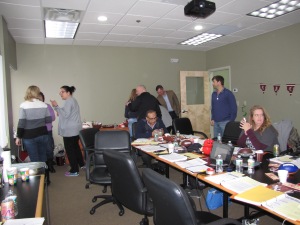“Neither rain nor snow nor gloom of night …” may belong to the Post Office, but our Board Members braved the cold, snow and ice to focus on our mission and growth measures so we can have an even greater impact on Down syndrome cognition research.
On a very snowy Saturday, January 24, 2015, The LuMind Foundation board members flew in from California, New York, Illinois, and Ohio, and drove from closer locations to attend an in-person Board Meeting in Massachusetts. We want to thank all the Board members – You bring inspiration, vision and energy to the cause of Down syndrome cognition research.
There was plenty of energy at the meeting, as some members met their peers for the first time and others reunited with friends. Our theme was team and members were encouraged to wear their college or professional sports team colors. Although there were some rivalries, we are all on the same team when it comes to our mission: funding cognition research for people with Down syndrome.
In the upcoming months we will be sharing more on the outcome of our Board meeting where we discussed our strategic plan, fundraising events, and the state of the organization. We have big plans, a great team, and thanks to the research you’ve funded, an attainable bright future for all individuals with Down syndrome.
Check out some of the pictures below. See anyone you know?












 For many years, scientists believed that Down syndrome was too complex to understand, and they believed that there was no way to reverse or reduce the severity of cognitive impairment. However, via two distinct approaches, over the last decade scientists have made unprecedented progress towards identifying a treatment to ameliorate the cognitive impairment associated with Down syndrome.
For many years, scientists believed that Down syndrome was too complex to understand, and they believed that there was no way to reverse or reduce the severity of cognitive impairment. However, via two distinct approaches, over the last decade scientists have made unprecedented progress towards identifying a treatment to ameliorate the cognitive impairment associated with Down syndrome.